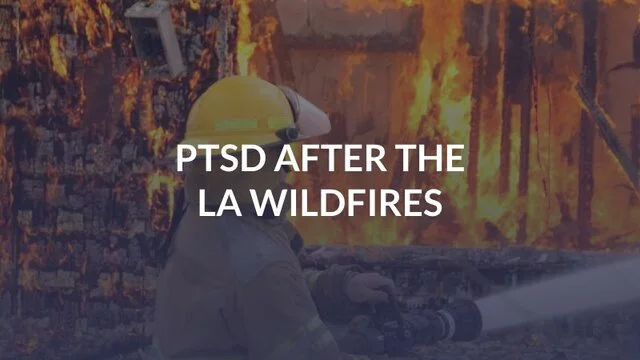
If you lived in Los Angeles during the recent wildfires, especially in or near a neighborhood that was directly affected, you may have noticed changes in how you feel, think, or function day to day. It’s not unusual to experience fear or sadness after a major disaster. But if those feelings are still lingering, intensifying, or interfering with your daily life, you could be dealing with signs of post-traumatic stress disorder (PTSD).
PTSD is more than just stress – it is a powerful psychological response to life-threatening events. For many wildfire survivors, the trauma doesn’t end when the flames are put out. The aftermath, including the loss of a home, evacuation, or even the smell of smoke in the air, can trigger strong emotional reactions long after the danger has passed. This has been especially true for residents affected by the Eaton and Hurst fires, which destroyed homes, disrupted communities, and forced thousands to flee under terrifying conditions.
What PTSD Can Look Like After A Wildfire
After a traumatic event, like the Los Angeles Wildfires, your body and brain can stay stuck in survival mode. The heightened state (commonly known as “fight or flight”) is meant to protect you during immediate danger. But when your nervous system can’t return to normal, it can lead to persistent mental health struggles.
PTSD symptoms don’t always appear right away, and they can look different for everyone. For some, it may show up as:
- Nightmares or flashbacks of the fire
- Feeling constantly on edge, irritable, or easily startled by sounds like sirens or helicopters
- Avoiding people, places, or conversations that bring back memories of the event
- Feeling disconnected from family, friends, or daily life
- Trouble sleeping, difficulty concentrating, or a loss of interest in things you once enjoyed
These responses are the brain’s way of trying to cope with overwhelming fear and loss. In some cases, people may experience what psychiatrists call a “moral injury”, which is when the trauma shakes their core beliefs and sense of identity. Losing a home or community doesn’t just affect your belongings, it can dismantle your sense of pride, safety, and belonging.
PTSD isn’t always obvious. Some people go numb, shut down emotionally, or throw themselves into taking care of others without ever processing their own trauma. But sooner or later, the weight of the experience can resurface, sometimes triggered by something as simple as a weather change or a news story about another fire. For those who lived through the chaos of the Hurst or Eaton Fires, even the smell of smoke in the air can bring back overwhelming memories.
You Are Not Alone – Resources and Help Are Available
It’s important to know that not every emotional reaction means you have PTSD, but if you’ve been struggling for weeks or months after the fire, and you’re finding it difficult to function, it may be time to seek support. Look out for warning signs like:
- Major changes in sleep, appetite, or mood
- Withdrawing from relationships or responsibilities
- Sudden substance use or risky behavior
- Feeling overwhelmed, hopeless, or numb
There are many ways to begin health. Talk therapy can help your brain reprocess trauma and begin to rebuild your sense of safety. Medication can also be helpful, especially when combined with therapy. And just as importantly, emotional support from loved ones and your community can play a powerful role in recovery.
Taking care of your mental health after a disaster is just as important as recovering physically or financially.
If you or someone you love is in crisis, call the LA County Mental Health Helpline 24/7 at 1-800-854-7771 or text “LA” to 741741 for free, confidential support. In an emergency, dial 911 or call the Suicide & Crisis Lifeline at 988.
If You Were Affected by the Wildfires, We’re Here to Help
At Singleton Schreiber, we understand that trauma takes many forms, including emotional and psychological harm. If the Los Angeles wildfires disrupted your life, your home, or your well-being, you may be entitled to compensation. Our legal team is here to stand with you, listen to your story, and fight for the resources you need to rebuild, both physically and emotionally.
Call Singleton Schreiber today at (619) 771-3473 for a free, confidential consultation.
